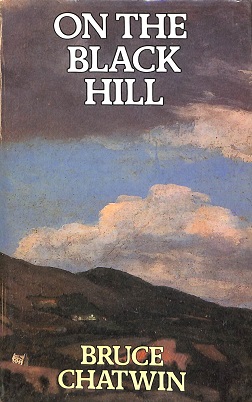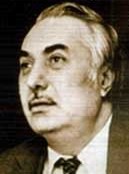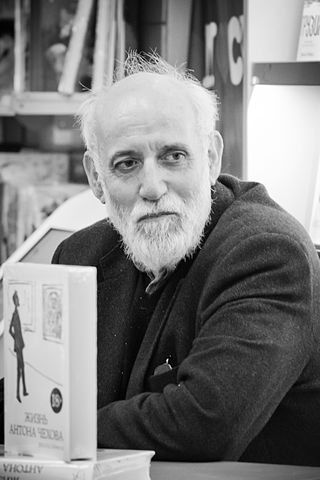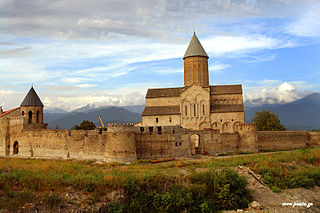
Oedipus was a mythical Greek king of Thebes. A tragic hero in Greek mythology, Oedipus fulfilled a prophecy that he would end up killing his father and marrying his mother, thereby bringing disaster to his city and family.

Patricide is the act of killing one's own father. The word patricide derives from the Latin word pater (father) and the suffix -cida. Patricide is a sub-form of parricide, which is defined as an act of killing a close relative. In many cultures and religions, patricide was considered one of the worst sins. For example, according to Marcus Tullius Cicero, in the Roman Republic it was the only crime for which the civilian could be sentenced to death.

On the Black Hill is a novel by Bruce Chatwin published in 1982 and winner of the James Tait Black Memorial Prize for that year. In 1987 it was made into a film, directed by Andrew Grieve.

Otar Vasilisdze Taktakishvili was a prominent Georgian composer, teacher, conductor, and musicologist of the Soviet period. Although in the West Taktakishvili is perhaps best known for his 1968 Sonata for Flute and Piano, his works include two symphonies, four piano concertos, two violin concertos, two cello concertos, and operas. He also wrote several symphonic poems and oratorios, as well as adaptations of Georgian folk songs and a multitude of compositions for instruments and voice.
Milady de Winter, often referred to as simply Milady, is a fictional character in the novel The Three Musketeers (1844) by Alexandre Dumas, père, set in 1625 France. She is a spy for Cardinal Richelieu and is one of the dominant antagonists of the story. Her role in the first part of the book is to seduce the English prime minister, the duke of Buckingham, who is also the secret lover of Queen Anne of France. Hoping to blackmail the queen, Richelieu orders Milady to steal two diamonds from a set of matched studs given to Buckingham by the queen, which were a gift to her from her husband, King Louis XIII. Thwarted by d'Artagnan and the other musketeers, Milady's conflict with d'Artagnan carries much of the second half of the novel.

Red Dragon is a psychological horror novel by American author Thomas Harris, first published in 1981. The story follows former FBI profiler Will Graham, who comes out of retirement to find and apprehend an enigmatic serial killer nicknamed "the Tooth Fairy". The novel introduces the character Dr. Hannibal Lecter, a brilliant psychiatrist and cannibalistic serial killer whom Graham reluctantly turns to for advice and with whom he has a dark past.

Jeg elsket Tiberius is a 1959 romance novel by Elisabeth Dored. It was first translated into English by Naomi Walford in Great Britain by Methuen and United States by Pantheon Books in 1963 under the name I Loved Tiberius. The novel was written as a careful reappraisal of the contemporary sources, placing Julia and Tiberius in a more positive light. The novel is set in 1st century BC Rome, centred on Julia the Elder, the daughter of Augustus and her life right up until her death. The novel begins with Julia's birth and her mother being forbidden to see her. The plot is mainly focused on Julia's love life, notably her relationship with her stepbrother, Tiberius.
One Life to Live is an American soap opera that was broadcast on the ABC network from 1968 to 2012. The series began with One Life to Live storylines (1968–1979). The plot continues in One Life to Live storylines (1980–1989). The plot in the next decade is outlined in One Life to Live storylines (1990–1999) and the story concludes in One Life to Live Storylines (2000–2013).

Mikheil Javakhishvili was a Georgian and Soviet novelist who is regarded as one of the top twentieth-century Georgian writers. His first story appeared in 1903, but then the writer lapsed into a long pause before returning to writing in the early 1920s. His recalcitrance to the Soviet ideological pressure cost him life: he was executed during the Great Purge and his writings were banned for nearly twenty years. In the words of the modern British scholar of Russian and Georgian literature, Donald Rayfield, "his vivid story-telling, straight in medias res, his buoyant humour, subtle irony, and moral courage merit comparison with those of Stendhal, Guy de Maupassant, and Émile Zola. In modern Georgian prose only Konstantine Gamsakhurdia could aspire to the same international level."

Patrick Donald Rayfield OBE is an English academic and Emeritus Professor of Russian and Georgian at Queen Mary University of London. He is an author of books about Russian and Georgian literature, and about Joseph Stalin and his secret police. He is also a series editor for books about Russian writers and intelligentsia. He has translated Georgian, Russian and Uzbek poets and prose writers.
A familicide is a type of murder or murder-suicide in which an individual kills multiple close family members in quick succession, most often children, spouses, siblings, or parents. In half the cases, the killer lastly kills themselves in a murder-suicide. If only the parents are killed, the case may also be referred to as a parricide. Where all members of a family are killed, the crime may be referred to as family annihilation.
This is a list of fictional stories in which illegitimacy features as an important plot element. Passing mentions are omitted from this article. Many of these stories explore the social pain and exclusion felt by illegitimate "natural children".

Otar Chiladze was a Georgian writer who played a prominent role in the resurrection of Georgian prose in the post-Joseph Stalin era. His novels characteristically fuse Sumerian and Hellenic mythology with the predicaments of a modern Georgian intellectual.

Mystery is a 1990 novel by American author Peter Straub, the second installment in Straub's loosely connected "Blue Rose Trilogy". The novel falls into the genre of crime fiction, and was preceded by Koko and followed by The Throat. The book was published by Dutton, won the 1993 Bram Stoker Award and was a 1994 WFA nominee

Arthur Mitchell, often referred to as the "Trinity Killer," is a fictional character and the main antagonist of the fourth season of the Showtime TV series Dexter. Mitchell is a serial killer who presents himself as an unassuming church deacon and family man. FBI agent Frank Lundy dubs him the "Trinity Killer" because of a recurring pattern of three killings based on traumatic events during Arthur's childhood. In the series, Mitchell is portrayed by John Lithgow.

The Bakhtrioni uprising was a general revolt in the eastern Georgian Kingdom of Kakheti against the political domination of Safavid Persia, in 1659. It was named after the main battle, which took place at the fortress of Bakhtrioni.
John Sampson is a fictional character in the mystery novel series Alex Cross and is one of the main characters.

A Man Was Going Down the Road is a novel written by Otar Chiladze in 1973. It was translated into English by Donald Rayfield in 2012.













